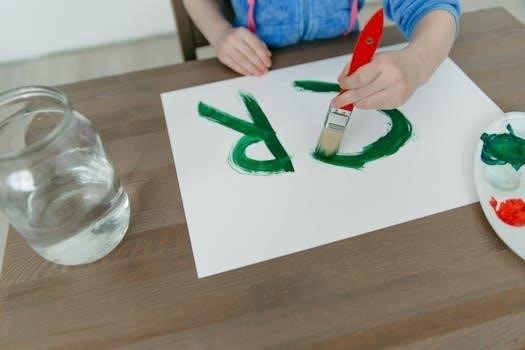Overview of “Letters to a Young Poet”
Rainer Maria Rilke’s “Letters to a Young Poet” is a compilation of ten letters written between 1903 and 1908 to Franz Xaver Kappus, an aspiring poet. These letters offer profound insights into artistic life and personal growth. They explore themes of solitude, self-discovery, and the creative process, making them influential for writers and artists.
Rilke’s Correspondence with Franz Xaver Kappus
The exchange between Rainer Maria Rilke and Franz Xaver Kappus began when Kappus, a young officer cadet at a military academy, sought advice from the established poet. Rilke, himself a former student of the same institution, responded to Kappus’s request, initiating a series of letters that would span several years. This correspondence wasn’t just a formal exchange; it was a deeply personal and reflective dialogue. The letters, written between 1903 and 1908, delve into the complexities of art, life, and the struggles of a young artist finding his voice. Rilke’s responses are insightful, offering not only guidance on writing but also on the importance of introspection and the acceptance of life’s difficulties. These letters, though directed to Kappus, provide universal lessons for anyone seeking a deeper understanding of creativity and personal fulfillment. The unique aspect of this correspondence lies in its authentic and genuine tone, where Rilke shares his own experiences and perspectives with remarkable honesty.
Thematic Focus of the Letters
The core of Rilke’s “Letters to a Young Poet” centers around themes vital to both artistic development and personal growth. A significant focus is the importance of solitude and introspection, urging the young poet to delve deep within himself to find authentic expression. Rilke emphasizes the necessity of embracing life’s uncertainties and difficulties, viewing them as integral to the creative process. Another key theme is finding one’s own unique voice, encouraging Kappus to resist external pressures and societal norms. Rilke’s advice is not limited to poetry; it extends to the broader aspects of life, including love, suffering, and the nature of human existence. The letters delve into the concept of patience and acceptance, urging a slow and deliberate approach to artistic and personal development. Overall, the letters are a profound meditation on self-discovery, the struggles of artistic creation, and the search for meaning in life.

Key Themes and Advice
Rilke’s letters explore solitude, introspection, and finding one’s voice. He advises patience, embracing difficulty, and accepting the creative process. These themes guide artistic and personal growth, offering timeless wisdom.

Importance of Solitude and Introspection
Rilke, throughout his correspondence with the young Franz Xaver Kappus, consistently emphasizes the crucial role of solitude and introspection in the life of an artist. He urges Kappus to turn inward, to delve deep into his own thoughts and feelings, rather than seeking validation or approval from the external world. Rilke believes that true artistic expression can only emerge from a place of profound self-awareness and understanding. He advocates for spending time alone, not as a form of isolation, but as an opportunity for deep contemplation and self-discovery. This solitude allows for the development of an authentic and unique voice, free from the influence of external pressures and expectations. By retreating into himself, the artist can connect with his inner landscape, uncovering the raw material for his art. Rilke portrays solitude not as a burden, but as a necessary space for creative gestation and spiritual nourishment, essential for the growth of an artist’s soul. He notes that approval from others is ultimately worthless compared to the inner growth derived from solitude.
Finding One’s Own Voice and Style
Rilke’s letters repeatedly stress the importance of finding one’s own unique voice and style, rather than imitating others. He encourages Kappus to delve into the depths of his own experience and express it authentically, without the constraints of pre-existing models or expectations. Rilke advises the young poet to examine the reasons why he feels compelled to write, to understand the inner necessity that fuels his creative impulse. He believes that true artistic expression arises from genuine self-discovery and the courage to be vulnerable and honest. Rilke cautions against seeking superficial recognition or adopting popular trends, emphasizing that a distinctive voice is cultivated through introspection and unwavering commitment to one’s inner truth. He guides Kappus towards developing an artistic style that is organic and unique to him, a reflection of his inner world and personal experiences. This process requires patience and a willingness to explore different avenues, ultimately allowing the artist to create something that is genuinely his own and resonates with his deepest self. The journey is about self-discovery.
Patience and Acceptance in Artistic Development
Rilke’s letters emphasize the critical role of patience and acceptance in artistic development. He advises Kappus not to rush the process of growth but to allow his artistic abilities to unfold organically, much like a plant that requires time to mature. He stresses that true artistic mastery is not achieved overnight, but rather through consistent effort, introspection, and a willingness to embrace the inevitable struggles and setbacks. Rilke encourages acceptance of the slow and sometimes painful journey of self-discovery, urging the young poet not to be discouraged by periods of creative dryness or self-doubt. He suggests that these moments are integral to the creative process, providing opportunities for reflection and deeper understanding. He believes that by patiently working through these challenges, the artist can develop a more profound and authentic expression of their unique voice. The true artist is patient. He is not hurried in his artistic pursuits. This patience is important.

Availability of the Text
The text is widely available in PDF format online, offering free access to various translations and editions. Many websites provide downloadable copies of Rilke’s influential letters.
PDF Versions and Online Access
Numerous online platforms offer PDF versions of “Letters to a Young Poet” for convenient access. These digital copies often include various translations, such as the renowned M.D. Herter Norton translation, and are easily downloadable. Many websites provide free access to these resources, allowing readers to explore Rilke’s insightful correspondence without cost. These online versions may also include introductions or biographical information about Rilke and his work, enhancing the reader’s understanding. Some sites also provide options for single-page or processed JP2 ZIP downloads. The availability of the text in PDF format ensures that Rilke’s timeless advice and inspiration are easily accessible to a global audience, fostering a deeper appreciation for his literary contributions. Access to these digital versions makes it easier to study, annotate, and share the letters, contributing to their continued influence on writers and artists. These easily attainable PDF copies ensure that the wisdom contained in Rilke’s letters remains readily available for generations to come, solidifying its place in literary history and providing ongoing guidance for creative individuals.
Different Translations and Editions
“Letters to a Young Poet” has been translated into numerous languages, resulting in various editions that offer differing nuances and interpretations of Rilke’s original German text. Among the notable translations is the work by M.D. Herter Norton, which is widely acclaimed for its clarity and faithfulness to Rilke’s style. Other translators, like Charlie Louth and Anita Barrows with Joanna Macy, have also presented unique perspectives, each capturing Rilke’s complex ideas through a distinct lens. These different versions reveal how the translator’s choices in vocabulary and phrasing can affect the reading experience. Each edition offers a slightly different understanding of the original text. Exploring these diverse translations can enrich one’s appreciation of Rilke’s work, encouraging readers to consider multiple layers of meaning. Comparing different editions allows a deeper comprehension of the subtleties within the letters. The availability of varied translations ensures that Rilke’s profound thoughts reach a wider audience, fostering ongoing engagement with his timeless advice for aspiring artists. The existence of multiple editions proves the adaptability and enduring relevance of Rilke’s work, confirming its place as a literary classic.

Impact and Legacy
Rilke’s “Letters to a Young Poet” has profoundly influenced countless writers and artists, offering timeless wisdom on creativity and personal growth. Its enduring relevance continues to inspire new generations of readers with its insights.
Influence on Writers and Artists
Rainer Maria Rilke’s “Letters to a Young Poet” has exerted a considerable influence on writers and artists across various disciplines, becoming a touchstone for those seeking a deeper understanding of the creative process. The letters, filled with introspective advice and profound observations, have resonated particularly with those navigating the complexities of artistic expression. Rilke’s emphasis on solitude, self-reflection, and the importance of cultivating one’s inner voice has provided a guiding light for many, encouraging them to embrace their unique perspectives and creative paths. The work’s exploration of patience and acceptance in artistic development has helped to temper expectations, fostering a more sustainable and fulfilling approach to creative endeavors. The book has been cited by many as a source of inspiration and practical advice, affecting the ways in which writers approach their craft and artists engage with their work. It’s a testament to the enduring power of Rilke’s words that they continue to shape the creative landscape today.
Timelessness of Rilke’s Advice
The enduring relevance of Rainer Maria Rilke’s advice in “Letters to a Young Poet” speaks volumes about its timeless wisdom. Despite being written over a century ago, the insights offered in the letters remain strikingly applicable to the challenges faced by artists and individuals today. Rilke’s focus on cultivating inner solitude and introspection transcends specific historical contexts, addressing fundamental human needs for self-understanding and authentic expression; His emphasis on patience and the acceptance of the slow, often uncertain, path of artistic development resonates with the modern struggle for instant gratification and success. The letters also provide a crucial reminder of the importance of finding one’s own voice and resisting external pressures. Rilke’s advice, therefore, is not limited by time or culture; it continues to serve as a powerful guide for anyone seeking to navigate the creative and personal aspects of life with depth, integrity, and purpose. The themes explored are universal and continue to inspire generations.

